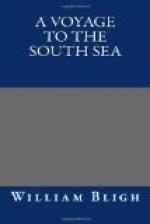Monday 25.
Being in want of plank I directed a saw-pit to be dug and employed some of the people to saw trees into plank. The greater part of this week the winds were moderate with unsettled weather.
Friday 29.
On Friday it blew strong from the south-west with rain, thunder, and lightning. We continued to catch fish in sufficient quantities for everybody and had better success with the seine. We were fortunate also in angling in the lake where we caught some very fine tench. Some of the people felt a sickness from eating mussels that were gathered from the rocks; but I believe it was occasioned by eating too many. We found some spider-crabs, most of them not good, being the female sort and out of season. The males were tolerably good and were known by the smallness of their two fore-claws or feeders. We saw the trunk of a dead tree on which had been cut A.D. 1773. The figures were very distinct; even the slips made with the knife were discernible. This must have been done by some of captain Furneaux’s people in March 1773, fifteen years before. The marks of the knife remaining so unaltered, I imagine the tree must have been dead when it was cut; but it serves to show the durability of the wood for it was perfectly sound at this time. I shot two gannets: these birds were of the same size as those in England; their colour is a beautiful white, with the wings and tail tipped with jet black and the top and back of the head of a very fine yellow. Their feet were black with four claws, on each of which was a yellow line the whole length of the foot. The bill was four inches long, without nostrils, and very taper and sharp-pointed.
The east side of the bay being not so thick of wood as the other parts, and the soil being good, I fixed on it, at Nelson’s recommendation, as the most proper situation for planting some of the fruit-trees which I had brought from the Cape of Good Hope. A circumstance much against anything succeeding here is that in the dry season the fires made by the natives are apt to communicate to the dried grass and underwood, and to spread in such a manner as to endanger everything that cannot bear a severe scorching. We however chose what we thought the safest situations, and planted three fine young apple-trees, nine vines, six plantain-trees, a number of orange and lemon-seed, cherry-stones, plum, peach, and apricot-stones, pumpkins, also two sorts of Indian corn, and apple and pear kernels. The ground is well adapted for the trees, being of a rich loamy nature. The spot where we made our plantation was clear of underwood; and we marked the trees that stood nearest to the different things which were planted. Nelson followed the circuit of the bay, planting in such places as appeared most eligible. I have great hopes that some of these articles will succeed. The particular situations I had described in my survey of this place, but I was unfortunately prevented from bringing it home. Near the watering place likewise we planted on a flat, which appeared a favourable situation, some onions, cabbage-roots, and potatoes.




